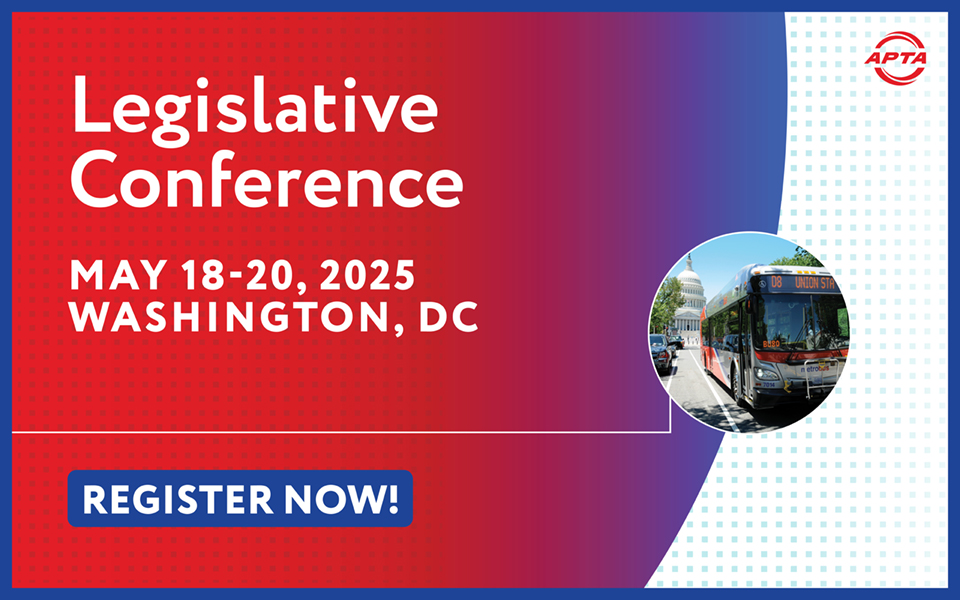APTA’s Sustainability/Operations Planning and Scheduling Workshop (August 10-13 in Denver, CO) is the premier forum for advancing cutting-edge practices in sustainability, multimodal planning, and scheduling in public transportation with a focus on increasing efficiencies, resiliency, and integration. The workshop is packed with thought-provoking speakers, roundtable discussions, host agency tours and education sessions that are run in two tracks: Sustainability, and Transit Operations Planning and Scheduling.
As APTA members, you are an integral part of the call for abstracts. This is an opportunity for you to be part of the educational program and share your expertise and skill set with your peers in the industry. Please refer to the submission topics for each track listed below. Once submissions are reviewed by a committee of members and staff; staff will begin extending invitations to those who were selected based on their experience and partnerships that are aligned with the program.
Please Note: we are seeking individual speaker submissions ONLY at this time – not full panel ideas. Please craft your abstract around you and/or a partner presentation not a full panel of moderator and several speakers. Your submission will be paired with other similar submissions to curate a well-rounded session.
We appreciate your interest in participating at our upcoming event. If you have more questions about this process, please email abstracts@apta.com
Deadline to Submit: Wednesday, March 26, 2025 at 11:59 PM ET (extended) |
Access the Submission Portal to submit your proposal.
Submission Details:
- You MUST be an APTA member in good standing to submit abstracts.
- Submit abstracts separately.
- Do not submit duplicate abstracts under different topics. Select the topic closest to your main ideas.
- Do not submit preselected full panel abstracts.
- Be sure to add ALL proposed speakers (you and a partner if it’s a joint presentation)
- APTA will communicate with the submitter for all notifications and deadlines, who must then share the information as needed with their speaker(s)
- Submissions should avoid being a sales pitch or overly commercial.
- All proposals must be submitted using the online form to be considered.
- Be concise when submitting your abstract ideas (350 words max)
- Submissions should reflect innovative, cutting-edge content.
- APTA will confirm if your submission has been accepted as a speaker on a panel or another opportunity.
- Submitters may submit multiple abstracts but will only have one opportunity to speak, if selected.
- Session topics are subject to change, depending on volume and quality of submissions received.
- Some submissions may be selected for a poster session, rather than a traditional session. If you would prefer to only be considered for a poster session, please choose that option.
- After a careful review, all submitters will receive an official notification by email.
- If selected, your submission will be paired with other similar submissions to curate a well-rounded session. APTA sessions are typically 60 minutes long consisting of a 45-minute presentation and 15-minute Q&A. So, each speaker or both co-speakers jointly will have approximately 10 to 12 minutes of presentation time on average.
- If selected, speakers are encouraged to support the event by registering. APTA does not cover registration, hotel or other expenses for speakers.
- Submissions are not automatically accepted and APTA reserves the right to make all final decisions on speaker selections.
NOTE: Decision notifications will be sent out mid to late May 2025.
Submission Topics
Sustainability:
- Zero Emission Vehicle: Lessons Learned
- Energy Efficiency Programs, Planning, and Projects
- Resilience Planning and Programs for Transit Agencies Big and Small
- Environmental Resilience Projects and Strategies
- DOT and NGO Partnerships in Sustainability
- Strategies for Sustainability Culture Change
- Funding Sustainability Projects
- On-Site Renewable Energy at Transit Facilities
- Small Transit Agency Sustainable Success Stories
- Rail and Light Rail Sustainability Innovations
- Workforce Development/Training
- Environmental Management Systems Benefits: tracking goals, communicating quantitative results
- ROI – Making the Case for Investing in Sustainability
- Other
- Poster Session ONLY
Operations Planning and Scheduling:
- Route Planning (i.e., network design, service changes)
- Scheduling
- Working with Data (i.e. ridership, OTP, travel time, methods, findings, storytelling, visualization)
- Public Engagement
- Microtransit
- Technology and Innovation (e.g., electrification, apps, signal priority, etc.)
- Fixed-Guideway (i.e., BRT and LRT)
- Facility Design (e.g., bus stops, roadway design, passenger terminals, etc.)
- Service Disruptions (i.e. Special Events, Construction/Maintenance, Unplanned Impacts)
- In-Reach (i.e. operator engagement, working with operations staff for service and culture change, coordinating with other departments, influencing leadership)
- Service Planning & Scheduling for Zero Emission Busses
- Navigating Funding Challenges
- Operations Planning Potpourri (i.e. any other topic that does not fit nicely into one of the above categories)
- Other
- Poster Session ONLY
Please use the online Submission Portal to submit your abstract.





